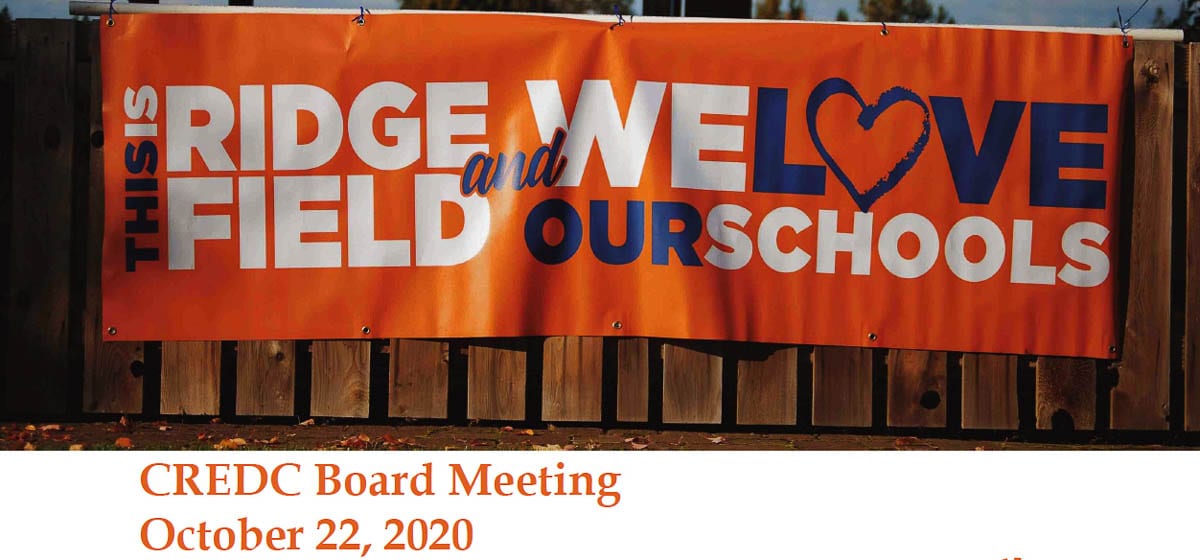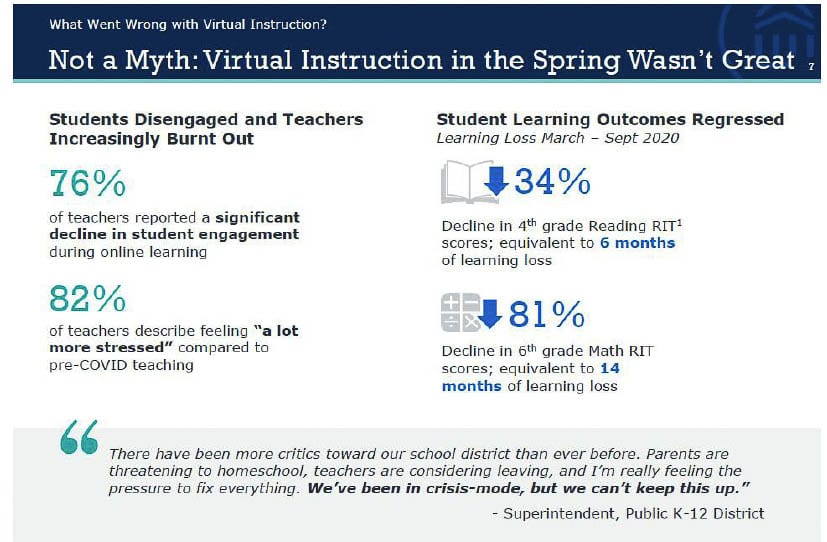Learning losses of 6 to 14 months highlights Ridgefield Superintendent Nathan McCann’s concerns
Ridgefield School Superintendent Nathan McCann recently addressed the Columbia River Economic Development Council (CREDC) providing an overview of the challenges the COVID-19 lockdown has had on his students and teachers. McCann is one of 38 members of the CREDC Board of Directors.
Presently, Ridgefield has most students engaged in remote learning, with select students receiving in-person learning at school. “Overall, we are pleased with the progress being made by the select group of students learning in-person, as well as their attendance,” said McCann.
More recently, the superintendents of nine Clark County school districts have collectively agreed to move forward with bringing small groups (pods/cohorts) of kindergarten students to school buildings for in-person instruction in the coming weeks. School officials believe the decision is safe and aligns with the state guidance for reopening schools.
McCann highlighted the continuum he and school superintendents have for instruction in the COVID-19 era. They range from totally remote instruction for all students, to select special education, homeless, ELL and others special needs students receiving in-person instruction. Next is hybrid instruction for grades K-5, followed by hybrid instruction for all K-12 students, and finally a return to regular school operations with modifications to address any ongoing COVID-19 requirements.

The challenges of school instruction last spring were highlighted. McCann shared data from a national survey. Students are disengaged and teachers feel burnt out, as 78 percent of teachers reported a significant decline in student engagement during online learning. Additionally, 82 percent of teachers reported being “a lot more stressed” compared to pre-COVID teaching.
The national survey showed student learning outcomes regressed during the March-to-September time frame. There was a 34 percent decline in 4th Grade reading scores. This is said to be the equivalent to six months of learning loss. Furthermore, there was an 81 percent decline in 6th Grade math scores, equivalent to 14 months of learning loss.
McCann shared a statement from an unnamed public K-12 school district superintendent: “There have been more critics toward our school district than ever before. Parents are threatening to homeschool, teachers are considering leaving, and I’m really feeling the pressure to fix everything. We’ve been in crisis mode, but we can’t keep this up.”
In an effort to learn more, a 10-question survey was sent to Ridgefield parents. They had two weeks to respond. There were 856 responses.
How concerned are you about your students’ social emotional well being right now? Half the parents said they were “somewhat” concerned; 16 percent “quite” concerned; 8 percent “extremely” concerned; and 26 percent “not at all” concerned.
Currently, does your student express feeling a loss in social connection and indicate a desire for opportunities to connect with peers and/or school staff? Only 15 percent said “never,” with 56 percent saying “sometimes” and 29 percent saying “always.”
Since school has started this year, has your student expressed difficulty staying engaged in online learning, completing assignments, and/or staying organized? Sixty percent said “yes,” while 40 percent said “no.”

There were 19 percent who requested additional information about mental health support through Family Solutions and Real Life Counseling.
The school district made a commitment to a robust and predictable remote learning platform. This included structured synchronous learning times and a heavy emphasis on live small group instruction.
The positives were the Ridgefield Remote program is earning very positive reviews, and there has been a dramatic increase in “face time” with teachers. The challenges are it is overwhelming for working families. There are no practical solutions for the youngest learners.
Looking ahead, McCann identified challenges facing the school district. In the near term, there is a significant budgetary challenge due to two factors. First is a loss of student enrollment, reducing funding from the state. Then there are additional costs related to coronavirus.
For the long term, the district has unmet capital needs as the 60 percent supermajority requirement for voter approval of school levies remains an obstacle. How to meet the social and emotional needs of students and how to make up the achievement gaps that have occurred are also challenges facing district officials.




